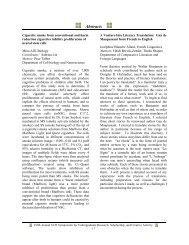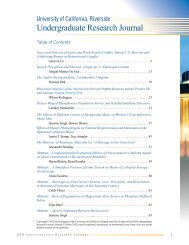Empress Zenobia and Gender Bias Among the Romans
Empress Zenobia and Gender Bias Among the Romans
Empress Zenobia and Gender Bias Among the Romans
Create successful ePaper yourself
Turn your PDF publications into a flip-book with our unique Google optimized e-Paper software.
<strong>Empress</strong> <strong>Zenobia</strong> <strong>and</strong> <strong>Gender</strong> <strong>Bias</strong> <strong>Among</strong> <strong>the</strong> <strong>Romans</strong><br />
Francesca Spolidoro<br />
certain Timagenes already stirring up revolt in Egypt, <strong>the</strong><br />
time was right for <strong>Zenobia</strong> (HA, “XXX Tyrants,” 30.11).<br />
On <strong>the</strong> way to Egypt, <strong>Zenobia</strong> captured Bostra, where a<br />
Roman garrison was located, <strong>and</strong> fought a series of battles<br />
with Probus. In <strong>the</strong> end Palmyra was victorious <strong>and</strong> held<br />
Egypt, with all its vast wealth <strong>and</strong> power. <strong>Zenobia</strong> must<br />
have known that like her ancestor, Cleopatra, she would<br />
not be left alone ei<strong>the</strong>r. Any disruption of wheat transports<br />
to Rome would have <strong>the</strong> people in <strong>the</strong> streets calling for<br />
her head. We know that Roman politicians had a way<br />
of inflaming <strong>the</strong> plebeians when it served <strong>the</strong>ir purposes.<br />
Aurelian would need little convincing from <strong>the</strong> street to<br />
turn his attention to Palmyra.<br />
During campaign against <strong>the</strong> Goths, Claudius succumbed<br />
to <strong>the</strong> plague <strong>and</strong> his bro<strong>the</strong>r Quintillus was murdered.<br />
Aurelius ascended <strong>the</strong> imperial throne. After defeating <strong>the</strong><br />
Scythians, <strong>the</strong> Alamanni, <strong>and</strong> <strong>the</strong> rogue Gallic Empire in<br />
separate campaigns, <strong>the</strong> Emperor turned his attention to<br />
Palmyra which now controlled Egypt <strong>and</strong> <strong>the</strong> East as far<br />
as Ancyra (White 147). Zosimus gives a complete telling<br />
of <strong>the</strong> events leading up to <strong>Zenobia</strong>’s defeat <strong>and</strong> capture,<br />
<strong>and</strong> Aurelius’s return to Palmyra <strong>the</strong> second time, when he<br />
razed it <strong>and</strong> put many to <strong>the</strong> sword (HA, “Life of Aurelian,”<br />
31.5-6). After this he took <strong>Zenobia</strong> to Rome in <strong>the</strong> fabled<br />
golden chains where she was forced to march behind his<br />
chariot while he received a lavish <strong>and</strong> boisterous welcome<br />
from <strong>the</strong> people <strong>and</strong> <strong>the</strong> Senate (Zosimus, 39-61).<br />
However, <strong>the</strong> speed <strong>and</strong> ease with which <strong>Zenobia</strong> was<br />
able to win all that territory, from near <strong>the</strong> Black Sea to<br />
Alex<strong>and</strong>ria, suggests two things: one, that <strong>the</strong>se cities<br />
were weak militarily <strong>and</strong> could not have stood up to <strong>the</strong><br />
Persian military, <strong>and</strong> two, <strong>the</strong>y welcomed <strong>Zenobia</strong>. “While<br />
Claudius was heavily preoccupied elsewhere, <strong>and</strong> when<br />
Aurelian had only recently taken over in Rome, Palmyra<br />
may still have been <strong>the</strong> best bet for survival for <strong>the</strong>se men<br />
of Egypt, Antioch, Tyana <strong>and</strong> Chalcedon” (Winsbury, 91).<br />
A strong, independent Palmyra, with self-interest in <strong>the</strong><br />
region was <strong>the</strong> last best hope for continual independence<br />
from an exp<strong>and</strong>ing Persian Empire. “By pursuing ends<br />
favorable to Palmyra, by aggressive military means, in <strong>the</strong><br />
default of Roman forces, <strong>Zenobia</strong>, Vaballathus <strong>and</strong> <strong>the</strong>ir<br />
generals may well have expected <strong>the</strong>ir own advantage<br />
also to be welcomed by <strong>the</strong> Roman government (Long,<br />
240).” <strong>Zenobia</strong> must have gambled on her ability to sway<br />
Aurelius into some kind of power sharing alliance since,<br />
in her mind at least, she had <strong>the</strong> writ from her husb<strong>and</strong>,<br />
<strong>and</strong> <strong>the</strong> Palmyrene military was necessary in <strong>the</strong> east.<br />
Why would Rome want to destroy so powerful an ally, an<br />
obvious buffer between it <strong>and</strong> her enemies in <strong>the</strong> east? The<br />
same could have been claimed for <strong>the</strong> break-away Gallic<br />
Empire on Rome’s nor<strong>the</strong>rn border. But while Gallienus<br />
had seemed content to keep <strong>the</strong>se two forces intact,<br />
Aurelius certainly did not. It is significant that in her post<br />
defeat interview with Aurelius, she is reported to have said<br />
that like Queen Victoria, Postumus’s sponsor in <strong>the</strong> north,<br />
her ambition was to gain a share of power “if distribution<br />
of territory allowed it” (Winsbury, 95). Aurelian had no<br />
intention to share power. His mission was to once again<br />
restore <strong>the</strong> Roman Empire to its former position as ruler of<br />
<strong>the</strong> world, no matter how problematical <strong>the</strong> administration<br />
of such an empire proved to be. Given <strong>the</strong> events of <strong>the</strong><br />
next century, perhaps Aurelian should have taken <strong>Zenobia</strong><br />
up on her offer.<br />
<strong>Zenobia</strong> <strong>and</strong> Odaenathus, if just for a while in a long<br />
distant past had a notion of Syria. Though <strong>the</strong>ir empire<br />
had no fixed borders, though <strong>the</strong>ir motivations were often<br />
reactions to <strong>the</strong> confusion of <strong>the</strong> times, is of little matter.<br />
For a country that only emerges in 1945, after centuries of<br />
Roman, Ottoman, <strong>and</strong> post World War I French colonialism,<br />
<strong>Zenobia</strong> is revered, not because she is a woman striving<br />
in a man’s world, or <strong>the</strong> “Warrior Queen” embattled by<br />
<strong>the</strong> super powers of her day, but because she became <strong>the</strong><br />
symbol of local pride, of self determination <strong>and</strong> of not<br />
waiting to see what <strong>the</strong> powers that be had in store for her.<br />
Maybe, simply, that she had become an Arab acting on <strong>the</strong><br />
fringes of power.<br />
6 2 U C R U n d e r g r a d u a t e R e s e a r c h J o u r n a l














